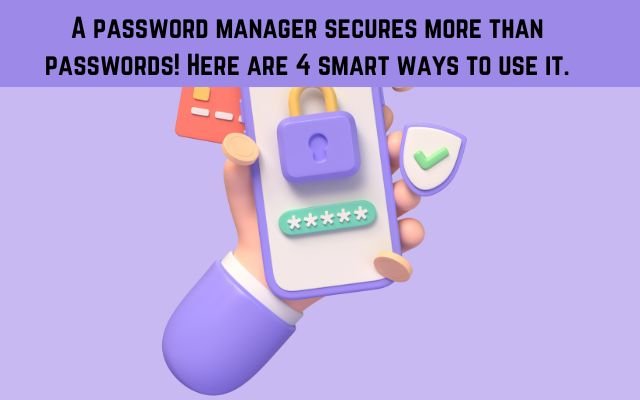4 Smart Ways to Use a Password Manager (Not Just Passwords!)
Discover smart ways to use a password manager beyond passwords! Securely store notes, payment details, IDs & more for better digital security.

Password managers do more than just store your login details. They offer Smart Ways to Use a Password Manager, such as securely keeping your credit card information, private notes, and important documents, making them a valuable tool for protecting your digital life.
Securely Storing Important Notes
If you do not like traditional note-taking applications, password manager can be a safe substitute. Numerous programs such as Bitwarden & 1Password, provide secure notes that let you safely store private data.
With additional security, Secure Notes functions similarly to standard note-taking program. Within your password manager, you have the ability to write a note, add crucial information and keep it secured. For enhanced security, you can even add additional password protection with some applications, such as Bitwarden.
This is particularly helpful for keeping private reminders, financial information, and personal papers safe from unwanted access.
Saving Payment Information Securely
Many password organizers allow you to securely save your payment information in addition to your passwords. This can speed up and simplify the checkout process while protecting your financial information if you shop online regularly.
Enter your name, card number, expiration date and security code just like you would when making a transaction to store a payment card. To make managing several cards for various uses easier- some password managers even let you arrange your saved cards into distinct categories or folders. Online purchasing is made easier with this extra organization & security which also protects your financial information.
Securely Storing Your IDs
When you shop online or sign up for a new service, you can occasionally be asked to present identification, like a driver’s license or passport. Before granting access, many services need identification verification, and having your passport information on hand might be quite helpful if you travel abroad. A password manager offers a safe and structured alternative to keeping these login credentials on an unprotected note or depending on hard copies.
Dedicated vaults for ID storage are provided by numerous password managers, such as Bitwarden and 1Password. Important information like your driver’s license number, passport number, expiration dates, and even your home address can be entered. For convenience, some services also let you attach scanned copies of these documents.
By keeping your IDs in a password manager, you reduce the risk of losing vital information while ensuring that it’s easily accessible when needed. Just like storing your payment details, keeping IDs in a password manager adds an extra layer of security and convenience to your digital life.
Using an Authentication App
If you haven’t set up two-factor authentication (2FA) yet, now is the time. 2FA adds an extra layer of security to your accounts by requiring a second form of verification in addition to your password. One of the best and most secure methods is using a one-time code from an authenticator app.
Popular standalone authenticator apps include Microsoft Authenticator and Google Authenticator, both of which generate time-sensitive codes that help protect your accounts. Many password managers also include built-in authentication features, making it even more convenient to secure your logins.
Download:
- Microsoft Authenticator for Android | iOS (Free)
- Google Authenticator for Android | iOS (Free)
Some password managers, like Bitwarden, offer their own authenticator tools. If you already use a password manager with this feature, you may not need a separate authenticator app. For instance, I use Bitwarden Authenticator, which works just like standalone apps but integrates directly with my password vault.
No matter which option you choose, using an authenticator app is a simple yet powerful way to enhance your security. It significantly reduces the risk of unauthorized access, so I always recommend enabling it for your most important accounts.
- Different HDR Formats: Choosing the Right One for Your TV
- QR Code Safety: This Tiny App Keeps You Protected
- How to Get the Most Value Out of Your Disney+ Subscription
FAQ: Smart Ways to Use a Password Manager Beyond Passwords!
1. Why should I use a password manager instead of writing down passwords?
A password manager securely encrypts and stores your login credentials, preventing unauthorized access. Unlike writing passwords on paper or saving them in a text file, a password manager ensures your data remains protected from hackers and prying eyes.
2. Can I use a password manager on multiple devices?
Yes, most password managers sync across multiple devices, including smartphones, tablets, and computers. This means you can access your stored credentials, payment details, and secure notes anytime, no matter which device you’re using.
3. Are password managers safe from hackers?
Password managers use strong encryption to protect your stored data, making it nearly impossible for hackers to access your information. However, it’s crucial to choose a reputable provider and enable two-factor authentication (2FA) for added security.
4. What happens if I forget my master password?
If you forget your master password, most password managers offer account recovery options, such as backup codes or biometric login. However, some services, like Bitwarden, may not have a recovery option to enhance security, so it’s important to store your master password safely.
5. Can a password manager help protect against phishing attacks?
Yes, a password manager helps prevent phishing by only auto-filling your credentials on legitimate websites. If you accidentally visit a fake website, your password manager won’t recognize it, reducing the risk of entering your credentials on a fraudulent site.



